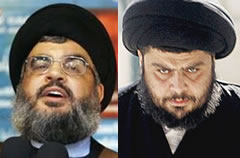 What was starting to look like a Shiite vs. Sunni conflict just got thrown a monkey wrench. Influential Iraqi Shia leader Moqtada al-Sadr has turned on Iran, Assad and Hezbollah. He is now expressing support for the Syrian Rebels.
What was starting to look like a Shiite vs. Sunni conflict just got thrown a monkey wrench. Influential Iraqi Shia leader Moqtada al-Sadr has turned on Iran, Assad and Hezbollah. He is now expressing support for the Syrian Rebels.
A senior member of the Sadrist Movement, refused to reveal details of the recent dispute that has erupted between Hezbollah chief Hassan Nasrallah and Moqtada Al-Sadr, saying: “Moqtada Al-Sadr formulates his positions based on Iraqi and Arab principles, and he sides with Arab peoples’ freedom and their right to self-determination.”
The Sadrist leader, who spoke to Asharq Al-Awsat on the condition of anonymity, said: “I do not know if it is a dispute or a difference of opinion between the two leaders…. disagreement is normal and does not necessary mean hatred.”
However a Baghdad official confirmed that deep divisions have erupted between the two Shi’ite leaders over Nasrallah’s continuing support for the Assad regime.
The Iraqi official told Asharq AL-Awsat: “Sadr believes that it is wrong for Shi’ites to become embroiled in the Syrian crisis by supporting Assad against the Syrian people…This will incite hatred of Shi’ites who have historically suffered from oppression and injustice in Iraq.”
“You’re traitors,” Hezbollah leader Hassan Nasrallah was quoted as telling Muqtada al-Sadr, the Iraqi Shi’ite leader. The accusation was the climax of the bitter dispute that developed between the two Shi’ite leaders after Sadr flatly refused Nasrallah’s request to send fighters to the battle in Syria.
The Kuwaiti newspaper Al-Seyassah − which published this week details about the dispute as related by a Shi’ite leader who deserted Sadr’s ranks − also reports that Sadr accused Nasrallah of a desire “to crush what is left of Iraqi national unity. The involvement of Iraqi Shi’ites in the war in Syria means a civil war in Iraq. If you want to endanger Lebanon that’s your business, but you have no right to endanger the Shi’ites in Iraq.”
Iraqi commentators assert that Nasrallah is in distress. His forces, which number some 50,000 fighters, are not sufficient for fighting in the Syrian city of Al Qusayr − guarding positions they have already captured − and at the same time defending the organization’s bases in South Lebanon and protecting the southern neighborhood in Beirut (a Hezbollah stronghold) as well as Lebanon’s Bekaa Valley region.
“Those missions are too big for the organization to handle, which is the reason for calling on Sadr for assistance,” wrote a Lebanese commentator. At the same time, other pundits believe Nasrallah’s ambition is to establish a “Shi’ite army” composed of the fighters of the Iraqi Mahdi Army and his own forces, who would be under Nasrallah’s command and funded by Iran.
Sadr’s refusal to help Nasrallah in Syria is also a slap in the face to the Iranian regime, especially after the Mahdi Army − which is commanded by Al Sadr and numbers about 60,000 fighters all over Iraq − was initially funded by Iran and received military training from Hezbollah members. Now, though, Sadr is involved in a political battle inside Iraq, in which he aspires to bring down Prime Minister Nouri al-Maliki (an ally of Iran). In this he is supported by members of the Sunni minority, who are conducting a violent and determined struggle against the Iraqi government; that is also the reason for his refusal to help Hezbollah.
By the way, that doesn’t mean there are no Mahdi Army fighters in Syria. According to Sadr, though, they are independent activists, or fighters who abandoned the Mahdi Army after Sadr decided to put a freeze on its military activities in Iraq.
In the war for survival, Nasrallah finds himself in a narrow and suffocating trench. Criticism against him in Arab countries is deep and widespread. His political rivals in Lebanon opposed his dragging the country “to its destruction” due to his participation in another country’s war, according to Saad Hariri, the Sunni former Lebanese prime minister. Leading Shi’ite cleric Ali al-Amin called on Nasrallah to withdraw his forces from Syria in order to prevent a sectarian war in Lebanon.
Agencies

Leave a Reply
You must be logged in to post a comment.